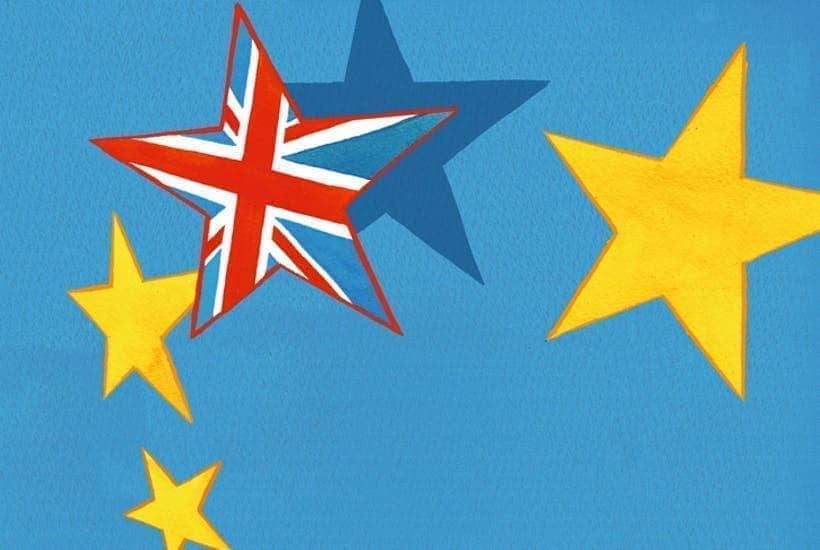Twelve months after a comprehensive trade deal was signed with the EU, where are we now? How has the UK performed?
Even arch Remainer Andrew Adonis admitted last year that ‘the UK government clearly did a better job than the EU in procuring vaccine supplies and putting in place urgent industrial production’. Yet so far we’ve had no financial or employment deregulation, we’ve signed up to a minimum corporation tax (like the EU), and we haven’t reformed our commitment to the European Court of Human Rights.
If Brexit were a pupil, what would its 2021 report conclude? Has the UK proven itself a strong independent learner, or should it try harder?
Trade (3/5)
Data showing a 16 per cent reduction in imports and exports to the EU make for difficult, though unsurprising, reading. Erect barriers with your single biggest trading partner and the effect on trade — the wider economy, businesses and consumers — will be negative.
But it has always been true that the costs of Brexit would be visible and immediate, while the benefits would be more diffuse, taking longer to be felt.
The Johnson government seems to believe our newfound freedom can be used to pass more pettifogging laws
Pessimists will claim that as trade secretary, Liz Truss simply kept existing trade arrangements in place, rather than really forging new deals. Yet those same critics said it wouldn’t be possible to roll over the agreements we benefitted from in the EU. That they were cut and pasted, swiftly and on terms no worse, is a significant achievement.
Meanwhile the direct impact to GDP of deals with New Zealand or Australia may be small, but they give negotiators experience and could open the door to much bigger agreements — such as the Comprehensive and Progressive Agreement for Trans-Pacific Partnership.
The Department for International Trade does, however, need to take more unilateral action. Tariffs are not a tax on foreign companies, they are a tax on British consumers. We need to strip away tariff and non-tariff barriers ourselves — alongside traversing the globe signing deals.
Northern Ireland Protocol (1/5)
The Protocol has been extremely costly to Northern Ireland and the British taxpayer. One economist puts the figure at £850 million — thus far. Trade, businesses and consumers have all suffered.
We’ve also witnessed sausage wars, fish fights, threats to our pets, continued posturing (including Maros Sefcovic’s warning last week that ‘no deal’ will be back on the table if the UK triggers Article 16), the EU’s invocation of Article 16 over vaccines, the DUP walking away from Good Friday Agreement committees (undermining the entire proposition that the Protocol was designed to protect the GFA), political instability, Lord Frost’s resignation as Brexit minister, the lack of movement on VAT or the acceptance that the European Court of Justice will have the final say on matters of EU law as it is applied in Northern Ireland.
Insofar as the Protocol has a redeeming feature, it broke the deadlock and allowed Boris Johnson to agree the Withdrawal Agreement, with a 2024 vote on the Protocol for the NI Assembly added.
But it clearly requires fundamental reform — preferably along the lines set out in Lord Frost’s Command Paper, whereby the UK would accept a continuing responsibility to help to protect the EU single market by applying EU customs rules to goods going via Northern Ireland into the single market, and in return goods must be able to flow much more easily into, and within, Northern Ireland.
Immigration (3/5)
Maintaining free movement may have been politically impossible, but we can still lament its end. Migration from the European Economic Area (EEA) was unequivocally beneficial for the UK. The average eastern European migrant contributed about £1,000 more to the UK’s public finances per annum than the average UK-born adult. The average western European migrant’s annual fiscal net contribution was about £3,700 higher than that of British-born adults.
Our new visa system limits low-skilled migration, with a salary threshold of £25,600 and minimum qualification requirements. Often, the low paid have skills that are important, and cutting off visa routes will leave staffing issues in many industries, not just high-profile ones like health and social care.
However, the UK now has good access to top talent outside of the EU. According to The Entrepreneurs Network think tank, the high potential individual visa announced in the summer could be ‘revolutionary’, allowing people who’ve graduated from a top global university to come into the UK without the requirement of a job offer. In short: our new visa system could be far worse.
Regulation (1/5)
Regulation is a cost, even when it is a worthwhile one. It makes production more expensive and often raises prices for consumers — and a huge opportunity from Brexit should come from incinerating pointless EU rules. When are we going to amend GDPR or the markets in financial instruments directive?
Worse, the Johnson government seems to believe our newfound freedom can be used to pass more pettifogging laws. We’re going to give more rights to sheep and cattle and ban adverts for cheese and jam. We might use taxpayers’ money to bail out failing companies — which previously would have been prohibited by EU state aid rules. This is a million miles from Singapore-on-Thames. And the government’s approach to net zero — where gestures, arbitrary targets and diktats come before sensible steps using the market — suggest we’ve learnt nothing from the EU’s way of operating.
Brexit was always an opportunity, never a guarantee. Anyone who thought that leaving the EU would automatically transform Britain into a sovereign utopia was mistaken — or misinformed. For countries, as with individuals, becoming free and independent means the possibility to shape their own destiny. The trouble is, politicians make foolish decisions as well as wise ones. Far too much of our post-Brexit planning is falling into the former camp.






Comments